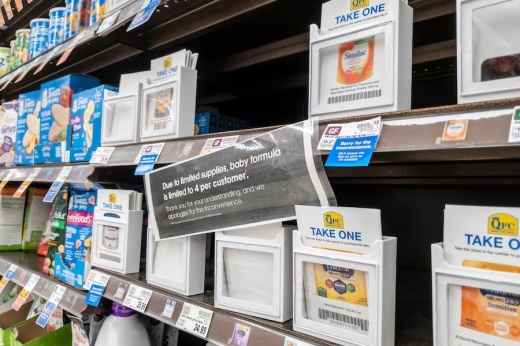According to a May 12 news release from The White House, the voluntary recall came following concerns about bacterial contamination at Abbott Nutrition's facility in Sturgis, Michigan, after four infants fell ill and two died; the plant has since remained offline.
Following a slate of actions taken by the federal government to increase the supply and availability of infant formula, the U.S. Food and Drug Administration announced May 16 the filing of a proposed consent decree of permanent injunction between the FDA and Abbott Nutrition and that Abbott Nutrition agreed to take corrective actions following an FDA inspection of the Strugis facility.
"Today's action means that Abbott Nutrition has agreed to address certain issues that the agency identified in their infant formula production facility in Michigan. The public should rest assured that the agency will do everything possible to continue ensuring that infant and other specialty formulas produced by the company meet the FDA's safety and quality standards, which American consumers have come to expect and deserve," FDA Commissioner Dr. Robert M. Califf said in a statement. "We recognize the hardships that parents and caregivers have faces in obtaining infant formula and the FDA if focused on boosting the availability of the country's supply of these products, including new steps regarding importation. We are also taking a look at the supply of infant formulas development by manufacturers across the country and around the world to determine if a reallocation of their distribution can be made to help get the right product to the right place, at the right time."
Although a light at the end of the tunnel may now be in sight for many parents, officials said it may take as long as six to eight more weeks before shelves are restocked.
In the interim, Tammy Sullivan, the manager of the neonatal intensive care unit and the maternal child director at Houston Methodist Willowbrook Hospital, said parents should try to order formula online to be shipped directly from big-box stores and manufacturers when possible and check lesser-known formula distributors, such as pharmacies.
"I know people are mixing their own formula or trying to dilute formula, but there's consequences to that—it changes the nutrient content of that formula. And I know that I saw the news that Texas Children's [Hospital] mentioned that yesterday that there were children hospitalized as a result," Sullivan said. "And then the other thing that I'm hearing a lot about is using someone else's breast milk—like a friend or a family member—and I would not recommend that because it's not pasteurized, and it's a body fluid, so it can transmit disease, and some medications go through to the breast milk, and you wouldn't want your baby taking something that you're not aware of. ... So that's the biggest advice to keep babies safe."
Additionally, Sullivan said families can utilize the Mothers' Milk Bank Austin's supply of donated breast milk if the baby has a prescription from their pediatrician—though Sullivan noted that supply is also running low.
"Right now, they have severe shortages of breast milk; they need more donors. So if anyone has a baby that's a year or younger and have a freezer full of milk, I would say contact the Mothers' Milk Bank Austin because as we get their supply up, then there's more in the community for families to be able to purchase for their babies that have special [dietary] needs," Sullivan said.
Though not all babies can tolerate breast milk due to dietary restrictions, Sullivan encouraged expectant parents to attend lactation classes prior to the baby's birth in order to have a better chance of being able to successfully breastfeed—lessening the reliance on formula.
"If you have a mom that's a new mom at home and she's struggling with breastfeeding, I would say contact your OB[-GYN] or pediatrician or a lactation consultant to get help early on so you can establish the woman's milk supply so you can avoid formula," Sullivan said. "There's just a lot of education that, I think, we as women, we don't always get when we're pregnant, and there's a lot you can learn before you have a baby. So look for lactation classes before you give birth, and that way you're prepared to breastfeed after birth, and then that decreases the need for formula."
For a complete list of Sullivan's recommendations, click here.





